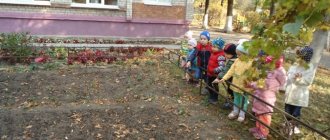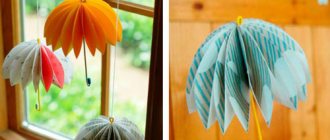Valeological education of children in a preschool educational institution
This article discusses the main tasks of valeology, its direction and purpose, as well as methods and techniques in valeology classes. This article will help preschool teachers see the need to introduce preschoolers to a healthy lifestyle.
Key words: valeology, health, healthy lifestyle, health culture, teaching, personal hygiene, healthy lifestyle, Federal State Educational Standard.
In order to understand whether it is necessary to use valeology in a preschool institution, it is necessary to understand what “valueology” is and where did this concept come from?
Valueology is the science of the art of being healthy, maintaining health, leading an active and healthy lifestyle, which must be learned from an early age.
The word “valeology” comes from the Latin word: “valeo” - to be healthy.” This term was introduced into scientific circulation by the Russian pharmacologist, Doctor of Medical Sciences, Professor Brekhman, Israel Itskovich, he became the creator of a new branch of medicine - valeology, and Brekhman is also the inventor of many medications.
Valeology includes several components: medicine, pedagogy, psychology, hygiene, physical education, social studies, ecology, biology, life safety.
In preschool institutions, this science has become one of the priority areas of the educational process for preschoolers.
Health has always been and will be in first place, therefore the central problem of valeology is the attitude towards individual health and the cultivation of a culture of health in the process of individual development of the child’s personality.
“Valeology is an interscientific direction of knowledge about human health, about ways to ensure it, form and preserve it in specific conditions of life. As an academic discipline, it represents a body of knowledge about health and a healthy lifestyle. E. N. Weiner" [4]
The goal of valeology in preschool educational institutions is to develop health and expand the reserve capabilities of the body of children from an early age, increasing the quantity and quality of health.
Weiner Eduard Naumovich identified the main tasks of valeology :
- Research and quantitative assessment of human health and health reserves.
- Formation of an attitude towards a healthy lifestyle.
- Preservation and strengthening of human health and health reserves through introducing him to a healthy lifestyle [1].
The subject of valeology is individual health and human health reserves, as well as a healthy lifestyle. This is one of the most important differences between valeology and preventive medical disciplines, the recommendations of which are aimed at preventing diseases.
From the outside it may seem that this science does not contain anything complicated. However, it is not. After all, valeology considers health comprehensively, holistically, including all its sides and aspects and studying it from all sides and options. Due to the global nature of the concept, valueology is associated with a whole complex of other sciences.
According to the Federal State Educational Standard, the educational field is aimed at achieving the goals of protecting children's health and forming the basis of a culture of health by solving the following tasks:
- Preservation and strengthening of children’s physical and mental health
- Education of cultural and hygienic skills
- Formation of initial ideas about a healthy lifestyle [2].
Raising a valeological culture in children means creating motivation for the formation, preservation and strengthening of health.
The valueological culture of a preschooler implies:
– knowledge about your health;
– conscious attitude towards human health and life;
– the ability to protect, maintain and maintain health;
– valeological competence.
The Federal State Educational Standard (FSES) identifies the main areas of valnology:
– Human structure.
– The importance of healthy food.
– How to maintain your health. [2]
The direction of work of valeological education of preschool children should be implemented not only within the framework of direct educational activities (DEA) (in the classroom), but also during the organization of: leisure activities, entertainment, matinees, walks, and routine moments.
The main allies of the teacher in maintaining the health of the preschooler are the parents. Interaction with parents is necessary, as they are the standard for the child. The teacher needs to convey to them the importance and need to participate in raising the health of their children. To do this, it is necessary to conduct consultations on the topic of “health”; events together with parents “mom, dad, me - a sports family”, etc.
Methods and techniques in valeology classes:
Regardless of the nature of the educational activity, the teacher uses a combination of techniques from four groups of methods (verbal, visual, practical, game).
Verbal method - in a preschool institution, speech is important not only as a means of learning, but also as a way of communication. For younger groups, this means faster speech development, and for older groups, an expansion of vocabulary.
- dialogue
– conversation (reasoning)
– explanations
– reading literature
Visual method - the use of visualization is necessary for the successful implementation of the objectives of the educational process. Since preschool children perceive information only when accompanied by illustrations.
– observation
– display (examination of paintings, illustrations)
– demonstration (slides, filmstrips, films)
Practical method - The techniques of this method involve the child’s practical mastery of reality.
– drawings
– applications
– crafts
– experiments
The game method allows preschoolers to master entire blocks of new valeological knowledge, skills and abilities.
– didactic
– movable
– theatrical
Innovative method - allows the child to move with the times, master new games, developing logic, thinking, fine motor skills, etc.
– Montessori
– fairytale therapy
– sand therapy
– TRIZ, etc.
Valueology in kindergarten is very important in the education of the future schoolchild. This science teaches preschoolers to take care of their health and strengthen their body, preventing possible diseases. Since valeology includes a whole complex of sciences, children, in addition to taking care of their bodies, learn to correctly express their emotions and feelings, taking care of their psycho-emotional state. They learn not to be afraid of the dangers around them, but to beware of them and look for ways to eliminate them, and also develop the need to take care not only of themselves, but also of the people around them.
Literature:
- Weiner E. N. Valeology: Textbook for universities. 2001. - M.: Flinta: Nauka, 2001. - 416 p.
- Federal State Educational Standard for Preschool Education (approved by order of the Ministry of Education and Science of the Russian Federation dated October 17, 2013 No. 1155, registered with the Ministry of Justice of Russia on November 14, 2013 No. 30384) access mode: //www/firo.ru/? page_id=11678
- From birth to school. Approximate general educational program for preschool education / Ed. N. E. Veraksy, T. S. Komarova, M. A. Vasilyeva. — M.: MOSAIKA$SYNTHESIS, 2014. — 334 p.
- “Valeology: a textbook for universities,” 2021 (quote from the Google Books library).
Methodological development "Valeology"
Preparatory group
Goal: to consolidate knowledge about health and diseases that can be avoided. Using rules to take care of your own health. Secrets of longevity, vocabulary work to describe the human condition.
Topic 2: “Your mood”
2nd junior group
Goal: to develop emotional well-being in children. Stability, positive self-esteem.
Middle group
Goal: to continue working on developing positive emotions in children, the ability to assess the emotional state of another person, using various pedagogical techniques.
Senior group
Goal: to develop the ability to self-regulate behavior in various situations.
Preparatory group
Goal: to develop abilities in assessing one’s own behavior, its voluntary correction, the formation of mental new formations (perseverance, endurance).
March
Topic 1: “Hardening the body”
2nd junior group
Goal: to give children an idea of a positive attitude towards hardening procedures, teach them how to perform exercises, and remember the complex.
Middle group
Goal: to develop children’s knowledge that exercise is useful and necessary. Learn to perform play gymnastics using musical accompaniment.
Senior group
Goal: to continue to build knowledge about different types of hardening activities. Health-improving gymnastics in the daily routine.
Preparatory group
Goal: to cultivate a stable positive attitude towards hardening activities, to teach children to perform familiar complexes independently.
Topic 2: “Sleep – benefit or harm?”
2nd junior group
Goal: to form a positive attitude towards adherence to the daily routine, to give an understanding that during sleep a person rests. Talk about what a person needs to sleep.
Middle group
Goal: to form an idea of what animals hibernate and why they need it. Develop an understanding of the benefits of sleep.
Senior group
Goal: to consolidate knowledge about how a person restores strength during sleep, conditions for organizing healthy sleep for himself and others.
Preparatory group
Goal: to develop knowledge about what a person needs in order to be healthy, to cultivate self-regulation of behavior in the daily routine.
April
Topic 1: “The heart is the main human organ”
2nd junior group
Goal: to form in children the idea that the heart pumps blood through our vessels. All animals have a heart.
Middle group
Purpose: to give an idea of how the human heart works, what conditions are necessary for its health, since it pumps blood throughout the body.
Senior group
Goal: to consolidate children’s knowledge of how a person should take care of their health, especially about heart health, to tell about the structure of the heart.



